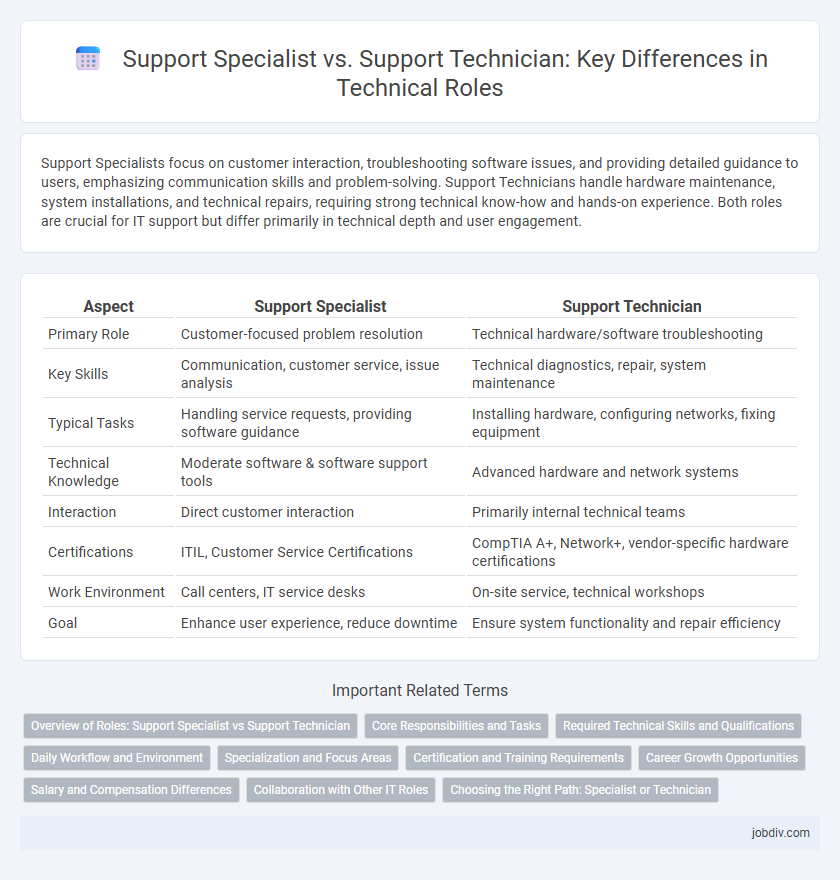Support Specialists focus on customer interaction, troubleshooting software issues, and providing detailed guidance to users, emphasizing communication skills and problem-solving. Support Technicians handle hardware maintenance, system installations, and technical repairs, requiring strong technical know-how and hands-on experience. Both roles are crucial for IT support but differ primarily in technical depth and user engagement.
Table of Comparison
| Aspect | Support Specialist | Support Technician |
|---|---|---|
| Primary Role | Customer-focused problem resolution | Technical hardware/software troubleshooting |
| Key Skills | Communication, customer service, issue analysis | Technical diagnostics, repair, system maintenance |
| Typical Tasks | Handling service requests, providing software guidance | Installing hardware, configuring networks, fixing equipment |
| Technical Knowledge | Moderate software & software support tools | Advanced hardware and network systems |
| Interaction | Direct customer interaction | Primarily internal technical teams |
| Certifications | ITIL, Customer Service Certifications | CompTIA A+, Network+, vendor-specific hardware certifications |
| Work Environment | Call centers, IT service desks | On-site service, technical workshops |
| Goal | Enhance user experience, reduce downtime | Ensure system functionality and repair efficiency |
Overview of Roles: Support Specialist vs Support Technician
Support Specialists primarily handle customer inquiries and provide problem resolution through communication channels, emphasizing technical knowledge combined with strong interpersonal skills. Support Technicians focus on hands-on troubleshooting, system maintenance, and hardware or software installations, often working directly with technical infrastructure. Both roles require detailed technical expertise but differ in their approach, with Specialists centering on user support and Technicians on practical technical execution.
Core Responsibilities and Tasks
Support Specialists primarily manage customer inquiries, troubleshooting software issues, and providing tailored technical guidance to enhance user experience. Support Technicians focus on maintaining hardware systems, performing installations, and resolving network-related problems to ensure operational efficiency. Both roles require strong problem-solving skills but differ in their emphasis on software support versus hardware and infrastructure maintenance.
Required Technical Skills and Qualifications
Support Specialists require advanced troubleshooting skills, proficiency in customer support software, and strong knowledge of network configurations and operating systems. Support Technicians need hands-on technical abilities such as hardware repair, system diagnostics, and basic scripting knowledge for automation tasks. Certification requirements typically include CompTIA A+ for Support Technicians and ITIL or Microsoft Certified Solutions Expert (MCSE) for Support Specialists.
Daily Workflow and Environment
Support Specialists typically handle complex customer interactions and troubleshoot advanced software issues, working primarily in office settings or remotely with ticketing systems. Support Technicians focus on hardware maintenance, on-site repairs, and routine diagnostics, often operating in data centers or client locations. Daily workflows for Specialists involve problem resolution and customer communication, while Technicians prioritize physical device management and infrastructure support.
Specialization and Focus Areas
Support Specialists typically concentrate on customer-facing tasks, offering software troubleshooting, user training, and issue resolution across diverse platforms. Support Technicians focus on hardware maintenance, network infrastructure, and system diagnostics, ensuring optimal operational functionality. Both roles require technical expertise but differ in specialization, with Specialists emphasizing user support and Technicians prioritizing technical infrastructure.
Certification and Training Requirements
Support Specialists typically require certifications such as CompTIA A+ or Microsoft Certified Professional (MCP), focusing on customer interaction and problem-solving skills. Support Technicians often need more technical certifications like Cisco's CCNA or specialized hardware training to manage network infrastructure and hardware maintenance. Both roles demand continuous training, but Support Technicians emphasize hands-on technical expertise, while Support Specialists prioritize communication and software troubleshooting skills.
Career Growth Opportunities
Support Specialists often engage in advanced troubleshooting and client communication, positioning themselves for roles in IT management or customer experience leadership. Support Technicians typically focus on hands-on technical tasks, building expertise that can lead to specialized technician roles or systems administration. Career growth for Support Specialists tends to be broader, encompassing strategic and supervisory opportunities, while Support Technicians usually advance through deepening technical skills and certifications.
Salary and Compensation Differences
Support Specialists typically command higher salaries than Support Technicians due to their advanced expertise in system analysis and customer relationship management, with average annual earnings ranging from $50,000 to $70,000. Support Technicians earn between $35,000 and $55,000 annually, reflecting their focus on hardware troubleshooting and technical support tasks. Compensation variations are influenced by factors such as industry, certification levels, and geographic location, with specialists often receiving additional bonuses and incentives linked to performance metrics.
Collaboration with Other IT Roles
Support Specialists collaborate closely with network administrators and cybersecurity analysts to troubleshoot and resolve system issues efficiently, emphasizing user communication and workflow continuity. Support Technicians work alongside hardware engineers and software developers, providing hands-on diagnostics and technical repairs that ensure system stability and performance. Both roles require seamless interaction with IT teams to maintain a cohesive support infrastructure and optimize technical problem-solving processes.
Choosing the Right Path: Specialist or Technician
Support Specialists focus on in-depth problem-solving and customer interaction, leveraging advanced knowledge of software and systems to resolve complex issues efficiently. Support Technicians excel in hands-on technical tasks such as hardware maintenance, installation, and troubleshooting at the equipment level, ensuring operational functionality. Choosing the right path depends on whether you prefer direct user support with a broad technical scope or specialized technical work focused on physical infrastructure.
Support Specialist vs Support Technician Infographic

 jobdiv.com
jobdiv.com